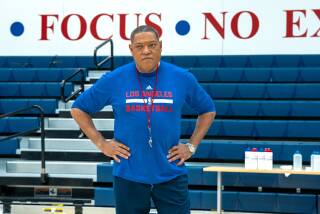Death of son of Clippers owner is ruled accidental
- Share via
The death earlier this year of Scott Sterling, 32-year-old son of Los Angeles Clippers owner Donald Sterling, was caused by a pulmonary embolism and “intravenous narcotic medication intake,” the Los Angeles County coroner said Monday. The death was ruled accidental.
Sterling was found dead in his apartment on Pacific Coast Highway in Malibu late on New Year’s Day. Los Angeles County Sheriff’s Department officials quickly determined that his death did not involve foul play but apparently stemmed from a drug overdose.
The coroner’s report concludes that Sterling injected a “narcotic medication” that was intended to be taken orally, according to an official statement. It also listed diabetes and use of oxycodone as “other significant conditions.”
Assistant Chief Coroner Ed Winter said Monday that injection of “ground-up” medication may have led to blockages in his blood system.
A version of oxycodone, the narcotic painkiller OxyContin, has been one of the nation’s most-abused prescription drugs, in part because those addicted build up tolerance to it. That has led some users to grind it up or dissolve it in water, making the potent extended-release drug easy to snort or inject for a faster, more intense high.
That practice and other issues with the painkiller led to a recent decision by the U.S. Food and Drug Administration to halt approval of new applications from generic drug manufacturers seeking to produce cheaper versions of OxyContin.
Coroner’s officials did not detail the amount of oxycodone in Sterling’s system. They are expected to release a full report on the death within two weeks.
Dr. Michael Baden, former chief medical examiner for New York City, said that although injecting narcotics meant for oral use is common among drug addicts, doing so does not often result in death. “Usually the person dies of an overdose of the drug,” Baden said. “It must be extremely severe to kill the person.”
The family released a statement shortly after Sterling’s death saying he suffered from diabetes, but it did not say how the disease could have played a role in his death.
“Our son Scott has fought a long and valiant battle against Type 1 diabetes,” the statement said. “His death is a terrible tragedy, the effects of which will be felt forever by our family and all those who knew and loved him. We sincerely appreciate the warm outpouring of sympathy and support from so many of our dear friends.”
Scott Sterling kept a low profile despite being the son of one of the Southland’s most famous real estate moguls. Few details about his personal life or employment were made public at the time of his death.
Sterling was arrested in 1999 in Beverly Hills in connection with the shooting of childhood friend Philip Scheid during an argument. Scheid survived the shotgun blast, and Sterling was not charged in the case.
At the time of his death, Sterling was living in the Malibu Beach Villas complex on Pacific Coast Highway. The property is owned by the Donald T. Sterling Trust, according to property records. Units there are advertised as being “ultra luxurious.”
More to Read
Sign up for Essential California
The most important California stories and recommendations in your inbox every morning.
You may occasionally receive promotional content from the Los Angeles Times.














